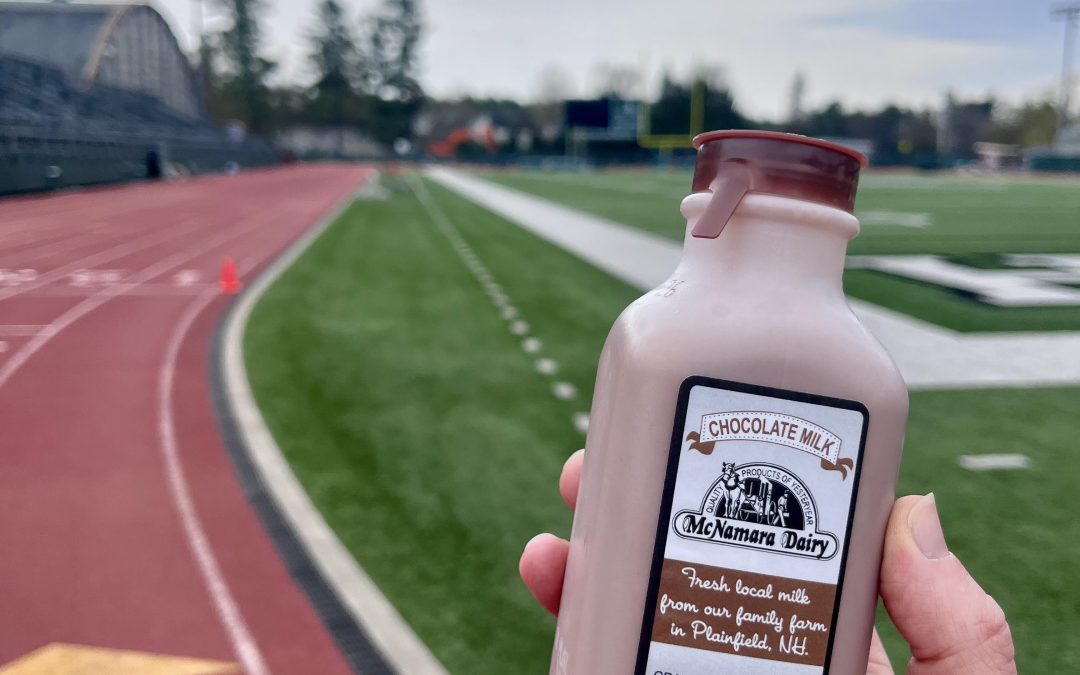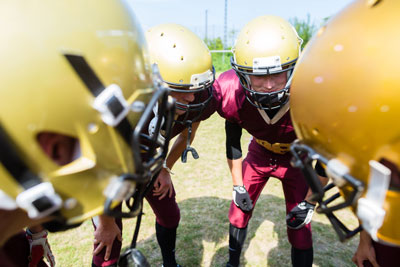Introduction
For football players, summer training leads right into a busy season and school year, this makes nutrition even more important. A grueling summer practice schedule requires adequate calories and macronutrients to ensure that you’re starting the season fueled and ready to perform your best. Many football teams are balancing strength training, and hot and humid two a day workouts. Nutrition can either make or break your performance during the intense schedules. Adequate nutrition can help athletes feel their best at every training session throughout the day.
Summer performance goals and in-season performance goals should look different for football athletes. In the summer, athletes should be practicing their nutrition and focus on muscle gain, weight gain, or body composition. Once the season starts weight maintenance should be a focus. It is common for football athletes to lose weight and muscle during the season due to high demand in sport. This is due to not nourishing the body with the nutrition required for practice and games.
In this post you will understand the importance of nutrition for the football athlete and learn more about specific fueling strategies for football athletes
Core Nutritional Needs for Football Players
Macronutrients for Sport Performance
Carbohydrates:
Carbohydrates serve as the primary source of energy for daily life and sport. Prioritize carbohydrates before and during workouts and games to maximize energy. Adequate carbohydrates provides the body with maximum energy to get through a workout but also prevents the breakdown of muscle mass. Carbohydrates include whole grains, fruits, veggies and dairy. Approximately 50% of total food intake throughout the day should come from carbohydrates.
Proteins:
Football is a physical sport that comes with increased soreness and fatigue. Lean protein, such as chicken, after practices and games can alleviate the soreness and decrease recovery time. Protein takes a longer time to digest and is NOT a major source of energy for sport, so strategic intake with a carb source is important. Prioritizing protein intake after sport ensures muscle repair and growth.
Fats:
For athletes with a weight gain goal, increasing fats throughout the day is a game changer. A small amount of high fat foods equates to a lot of calories! However, it’s not just about the calories; fats provide essential nutrients for hormone support, brain and heart health. Nuts, olive oil, avocado and fatty fish are examples of healthy sources of fat. And remember, a little goes a long way.
Meal Timing and Structure
Actual meal and snack timing will look different from summer into the school year. However, understanding the basics will help athletes adjust properly. At a minimum, athletes should aim for 3 meals and 2 snacks per day. Start by following the Moderate Athletes Plate with a solid portion of protein, grains and fruits and veggies for a balanced meal that supports performance.
Daily Meal Plan Breakdown
Breakfast:
The purpose of breakfast is to literally “break the fast”. Morning fuel before school kick starts your day with an energy boost. Football players never want to start the day under fueled as it is very difficult to catch up due to the demanding schedule. Be intentional about breakfast and use it as an opportunity to get ahead of the day.
Lunch:
With two-a-day workouts, lunch is a great opportunity to reset and refuel. Lunch should be composed primarily of carbohydrates and grains. These carbs will help you refill your energy stores that can be used for an afternoon practice or game. Still include a source of protein, fat, fruits and veggies for adequate calories, fiber, fullness and satiety.
Dinner:
The focus of dinner is to promote recovery and refuel from a hard practice. The actual time dinner is served can be challenging as it may be late at night. However, athletes should never go to bed hungry. Include lean sources of protein to promote muscle repair and growth. Starchy carbs like rice, breads, pastas, or potatoes help refill energy stores. It is crucial to refill these stores so they can be used the next day for training AND school work.
Snacks:
A general rule of thumb is to never go more than 3 hours in between eating. This is where snacks fit in! Snacks can help keep energy and blood sugar managed. Snacks can aid in overall calorie intake and also extra calories. This can be beneficial for all athletes but especially for those looking to gain weight.
Pre-Game/Practice Nutrition
For players with a lot of playing time and snaps, the Hard Athletes Plate should be followed ~3 hours before warm ups. The Hard Training plate consists of half the plate grains ensuring the body with adequate calories and energy for the full 60 minute game time. Protein and fat should still be consumed but pay close attention to portions as these foods digest slower and may cause stomach upset.
30-60 minutes before game time, have simple carbohydrates for a quick burst of energy before tapping into those energy stores. This could be before or after warmups. Athlete favorites include, applesauce pouches, fruit snacks, sport chews (like clif blocks or honey stingers), fig newtons, oranges or bananas, gold fish. Top off the carbs with water and electrolytes.
Post-Game/Practice Recovery
Post workout meals should mirror the athletes plate (do you see a trend here?!). Lean protein should be emphasized at this meal to promote muscle repair and growth. Grains are also important to refill the energy stores that were used during games and practice. A combination of both carbohydrates and protein work together to reduce muscle soreness. And don’t forget fruits and veggies! Adding color to all meals is beneficial for overall health and growth and development.
Rehydration tips
Football is a sport where players wear a lot of of gear and helmets. Combine this with practicing in hot humid weather in August and September and players could lose significant sweat and electrolytes. Because of this, sweat rates tend to be higher for football players meaning they need to have a focus on rehydration after practice or games. Rehydration includes not just water, but adding in electrolytes like sodium, potassium, and chloride into their post workout meals or beverages and helps them get back to that hydrated state. Rehydrating also helps with the recovery process.
Common Mistakes to Avoid
Let’s dive into a few mistakes that I see most often:
Skipping meals
Breakfast is the #1 meal that is skipped for high schoolers. Student athletes are trying to maximize sleep and are rushing out the door to get to school. However, breakfast is necessary to start fueling for those afternoon workouts. Set up your evening training sessions early on in the day.
Over-relying on fast food
Fast food is easy for busy evenings but utilizing the drive thru too often can affect energy and recovery. Some restaurants have healthier options but the best option for athletes are home cooked meals where you can control the portions and ingredients. Enjoying fast food or a restaurant meal isn’t off limits, but when is the best time? After competition and knowing the next day is a lower intensity workout or rest day.
Ignoring hydration
Hydration should be a constant throughout the day; using every opportunity to drink water at and around meals. Dehydration can impact performance, focus, attention and movement. Feeling weak, light headed, and cramping is a sign of dehydration. Use urine color as a sign to if you are hydrated; aiming for light yellow. Start off with half your body weight in ounces of water. For every 15 minutes of exercise, intake about 8 ounces of water or a sports drink. Drinking on a schedule can help with maintaining hydration.
Sample One-Day Meal Plan for a High School Football Player
What does a game day meal plan look like for a 7pm start?
- Conclude 8-10 hours of quality sleep with a nutrient and carbohydrate dense breakfast
- Bagel with peanut butter, banana, smoothie with protein powder, 3 scrambled eggs
- Mid morning snack
- Trail Mix, wheat think crackers and beef jerky
- Lunch: carbohydrate heavy with some protein and fat
- Sub sandwich, pretzels
- Yogurt parfait
- Sports drink
- Pre game meal: 3pm
- Pasta with marinara sauce
- Grilled chicken
- Pre workout snack 6pm
- Intra workout
- Sports drink throughout game
- Half-time: 2 packs of fruit snacks
- Post workout meal
- Pizza with a side of chicken tenders
Conclusion
The right nutrition can give players the energy to power through tough practices, the strength to perform under pressure, and the ability to recover faster between games. Whether it’s staying hydrated, building meals around performance goals, or timing snacks for optimal energy, every choice matters. Start making small, consistent changes, and you’ll feel the difference on and off the field.
Ready to take your nutrition to the next level? Check out the Fuel Your Performance bootcamp online course!


